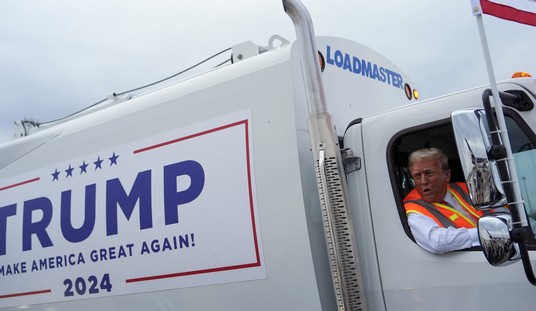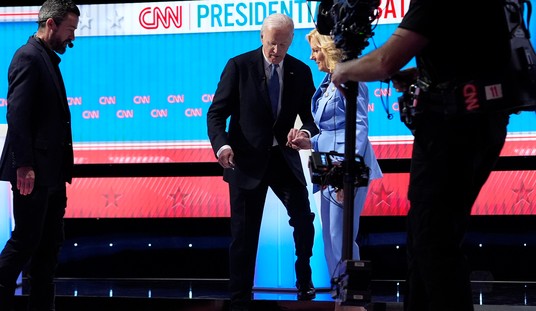A mild surprise here, as Judge Roger Vinson’s earlier ruling seemed fairly categorical. If a law is unconstitutional, then implementation should be abandoned, and Vinson’s ruling suggested that no further clarification would be necessary. In his stay, Vinson now appears to press for an expedited Supreme Court review:
In his ruling, Vinson repeated what he has said previously — that “the citizens of this country have an interest in having this case resolved as soon as practically possible.”
“That was nearly eleven months ago,” he wrote. “In the time since, the battle lines have been drawn, the relevant case law marshaled, and the legal arguments refined. Almost everyone agrees that the constitutionality of the Act is an issue that will ultimately have to be decided by the Supreme Court of the United States. It is very important to everyone in this country that this case move forward.”
And in fact, the stay in this case is only good for seven days, and is predicated on the Obama administration filing an application for expedited appeal, either with the appeals court or the Supreme Court:
After careful consideration of the factors noted above, and all the arguments set forth in the defendants’ motion to clarify, I find that the motion, construed as a motion for stay, should be GRANTED. However, the stay will be conditioned upon the defendants filing their anticipated appeal within seven (7) calendar days of this order and seeking an expedited appellate review, either in the Court of Appeals or with the Supreme Court under Rule 11 of that Court.
Otherwise, Vinson ruled, his original ruling has an immediate injunctive effect that nullifies the entirety of the ObamaCare law. He also expressed no small amount of derision for the respondents’ argument to the contrary:
So to “clarify” my order and judgment: The individual mandate was declared unconstitutional. Because that “essential” provision was unseverable from the rest of the Act, the entire legislation was void. This declaratory judgment was expected to be treated as the “practical” and “functional equivalent of an injunction” with respect to the parties to the litigation. This expectation was based on the “longstanding presumption” that the defendants themselves identified and agreed to be bound by, which provides that a declaratory judgment against federal officials is a de facto injunction. To the extent that the defendants were unable (or believed that they were unable) to comply, it was expected that they would immediately seek a stay of the ruling, and at that point in time present their arguments for why such a stay is necessary, which is the usual and standard procedure. It was not expected that they would effectively ignore the order and declaratory judgment for two and one-half weeks, continue to implement the Act, and only then file a belated motion to “clarify.”6
Furthermore, Vinson goes right up to the edge of accusing the Obama administration of lying to the court:
The defendants have suggested, for example, that my order and judgment could not have been intended to have the full force of an injunction because, if I had so intended, I would have been “required to apply the familiar four-factor test” to determine if injunctive relief was appropriate. …
I did not undertake this four-factor analysis for a simple reason: it was not necessary. Even though the defendants had technically disputed that the plaintiffs could satisfy those four factors, the defendants had acknowledged in their summary judgment opposition brief that, if I were to find for the plaintiffs, separate injunctive relief would be superfluous and unnecessary. The defendants expressly assured the court that, in light of the “long-standing presumption that a declaratory judgment provides adequate relief as against an executive officer, as it will not be presumed that that officer will ignore the judgment of the Court,” any declaratory judgment in the plaintiffs’ favor “would [ ] be adequate to vindicate [the plaintiffs’] claims.” Defendants’ Memorandum in Opposition to Plaintiffs’ Motion for summary Judgment (doc. 137), at 43. Consequently, there was no need to discuss and apply the four-factor test to determine if injunctive relief was appropriate because the defendants had confirmed that they would “not . . . ignore the judgment of the Court” and that my “declaratory judgment would [ ] be adequate.” In other words, the defendants are now claiming that it is somehow confusing that I bypassed the four-factor test and applied the “long-standing presumption” that they themselves had identified and specifically insisted that they would honor.
Basically, this forces the Department of Justice to expedite the appeals process, which they were clearly hoping to avoid. The dilatory tactics that Vinson blasts in this ruling almost certainly won’t impress the appellate court, either. Furthermore, the order forces the Obama administration to fight on Vinson’s ruling first and now rather than wait for a more friendly set of rulings and hope to marginalize Vinson down the road.
The White House asked for a clarification. They got a trip to the woodshed instead, and a very short time frame to stop the halt to ObamaCare that Vinson’s ruling creates.
Update: The effect of Vinson’s stay will be indefinite if the DoJ files for an expedited appeal within the seven-day limit. Therefore, there is no need to ask the appeals court or Supreme Court for a further stay. Thanks to Michael G for the correction.







Join the conversation as a VIP Member